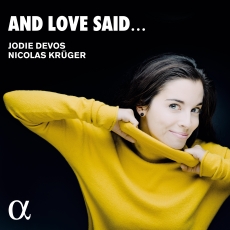Jodie Devos - And Love Said - MusicWeb International
I can’t recall enjoying a recital disc involving a soprano voice in recent years quite as much as this. It certainly helps if one has sympathy with the repertoire, and familiar as I am with most of the selections here there are many that are completely novel. In the case of those known quantities, namely the English songs other than Irene Poldowski’s, Jodie Devos is an absolutely captivating interpreter. From her initial entry in Frank Bridge’s Come to me in my Dreams I predict that most listeners will yield completely to the vernal warmth of her voice . Her other picks for this disc, each with English texts, are remarkably bold and unusual. This imaginative programming guarantees one’s full attention throughout the disc’s 70 minute duration. Devos is utterly alive to the demands of the language and brings something fresh and revealing to everything she attempts. In her wonderful accompanist Nicolas Krüger she has happened upon an ideal match.
Whilst the majority of the disc is devoted to English composers, the inclusion of rarities by Milhaud and Tailleferre and a diptych by the Belgian composer Patrick Leterme (one of Devos’s first accompanists) reflects the singer’s personal journey – she’s Belgian by birth, resident nowadays in France and trained at the RAM in London. In the booklet interview she reveals that she spent much of her time as a student getting her head (and voice) around the classic English song repertoire, an undertaking which in itself is virtually unheard of among continental singers. Nor does she pander to the obvious here; there are a few evergreens but the programme is carefully arranged around two complete, extremely challenging cycles which are heard all too infrequently even in Britain. Devos is evidently a fearless artist who is moved to share her offbeat enthusiasms with a non-British audience. In the circumstances I can scarcely imagine any of these numbers being delivered with greater vivacity, grace or technical skill.
Devos’s first album for Alpha was the terrific Offenbach Colorature (review). It proffered a sequence of unfamiliar, yet worthwhile and uplifting repertoire in which she displayed a formidable combination of instinctive control and thrilling vocal pyrotechnics. Although on the face of it the music on And Love Said…. couldn’t be more different, those same qualities are again present in abundance. But on this disc they are subsidiary to Devos’ communicative nous; her responsivenesss to these most challenging texts is extraordinary.
Even allowing for the fact that Devos trained in London, the diverse expressive and quintessentially English linguistic demands of Elizabethan poetry, W H Auden and Edith Sitwell must present a gargantuan challenge for the non-native interpreter, yet her contagious love for this music shines through unfailingly. I suspect some listeners may have become so conditioned to hearing British singers in this repertoire that encountering its performance in a distinctly ‘non-RP’ style might prove to be something of a shock. It really shouldn’t matter one jot; whilst Devos’s voice is hardly Home Service idiomatic it is radiant, communicative and empathic (I wonder if French and German listeners get hung up hearing fine British singers’ readings of Lieder or Chansons?) Devos unfailingly invests the various narratives with undiluted life. Her tone is flexible, bell like and crystalline. The instinctive, empathic understanding of her accompanist, the conductor and pianist Nicolas Krüger belies the fact that their partnership began almost by chance (Devos reveals in the booklet that they swapped enthusiasms during the run of an unnamed opera in which they both found themselves redundant in the second act) and that he had little experience or knowledge of much of this repertoire beforehand. He brings a wealth of colour and imaginative detail to his accompaniment, magnifying the freshness of each reading. It helps that the recording is terrific – the piano has a meticulously defined presence which consistently meets the voice half-way.
The two cycles complement each other most aptly. Devos’ accounts of both are insightful and communicative. In Britten’s On This Island, the tricksiness of Auden’s patter is a tough enough prospect for a native singer, yet notwithstanding the occasional hint of Gallic colour in Devos’s vowels, she is quite superb. If Let The Florid Music Praise is especially impressive, the rapidity with which Auden’s observations tumble atop one another in Now The Leaves Are Falling Fast perhaps elicit some slightly fuzzy diction but not nearly enough to compromise Devos’s abundant flair. The Nocturne is deeply felt whilst she camps up the cabaret mood of As it Is, Plenty with terrific vim. If Lynne Dawson’s delectable account of On This Island for Hyperion (in another mixed recital with Malcolm Martineau on CDA67227) remains the benchmark among versions for soprano, Devos’ sheer force of personality makes this a most enjoyable competitor- an absolute ‘must hear’ in fact. It is most enterprising of this pair to include Gurney’s Five Elizabethan Songs in its complete form – one usually only gets to hear the gorgeous Sleep. Devos is equally as alive to the subtleties of these ancient verses as she is to the more contemporary texts presented alongside them on this disc. She conveys a sense of impassioned purity in Sleep; the melancholy she shares in Tears is authentic rather than forced. I would not want to be without Susan Bickley’s fine account of this cycle with Iain Burnside in a Gurney survey on Naxos but to my ears it seems a tad studio bound by comparison - review.
Other highlights? Whilst I recognise Irene Poldowski’s name (it’s a pseudonym - she was really Régine Wieniawski, daughter of Henryk, the great Polish violinist and composer; like Devos she was Belgian-born) I had never heard a note of her music. The Blake setting, Reeds of Innocence, is delightful and packs a remarkable amount of incident and variety into its two minutes. It won’t take long for even an inexperienced listener to recognise how deeply Devos inhabits this number which stylistically recalls John Ireland. Poldowski’s setting of the anonymous text To Love is more overtly Debussian, and surely a little masterpiece. It’s yearning, serious, heartfelt and unbearably touching. Sober chords mingle with rippling figurations, Devos and Krüger make every syllable, note and rest count. I can’t get it out of my head. Another completely new acquaintance is Germaine Tailleferre’s charming Byron setting Tu Mi Chamas whose obscurity is inexcusable (if unsurprising) The two Milhaud songs (to English texts by Tagore) are also very fine; the second of these, Peace, My Heart, seems especially poignant. Devos negotiates the verbose surreality of Edith Sitwell’s Façade poems in three of Walton’s settings with remarkable guile and expressiveness, given their elusive, throwaway nature. Through Gilded Trellises sounds especially exotic and cosmopolitan; I suspect this account would have blown the composer away. Old Sir Faulk swings tipsily.
The Leterme songs are settings of Oscar Wilde. Whilst both are rather bracing and hint at expressionism Devos provides a tour-de-force of virtuosic, turn - on a sixpence singing. They’re both worth hearing for this reason alone, but it’s remarkable to me that they fit much less convincingly onto the arc of this recital than the Freddie Mercury/Queen ballad You Take My Breath Away which concludes it. Freddie Mercury? It shouldn’t work, but Devos makes sure it deserves its place. It’s maybe ‘pop’, but it’s a quality, timeless song by any measure. At no stage do either Devos or Krüger drench it in kitsch or exaggerated campness.
Listeners will get the most out of And Love Said if they fully embrace it for what it is, an entertaining and beautifully planned and performed mixed recital, chock full of unexpected delights. Jodie Devos has the personality to match her voice (it’s worth checking out some of her YouTube clips too – there’s a sensational recent TV studio performance of Mozart’s ‘Queen of the Night’ aria from The Magic Flute) and she seems to have landed on her feet as regards her outstanding accompanist. I don’t think she could be nurtured by a better label than Alpha either – they seem happy to let their charges take risks, and Devos takes plenty here. Let’s hope that her noble advocacy of English song bucks the Brexit trend and wins the genre a place in the hearts of our continental friends.

